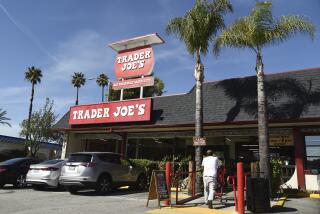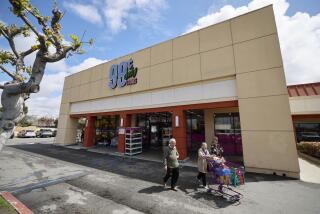A Boone for Wine Lovers
- Share via
The first branch of a new liquor store chain opened Saturday, but it wasn’t just any liquor store chain. The man behind it was Steve Boone, creator of the now-defunct Liquor Barn stores. One potential competitor traveled 3,000 miles just to see what Boone was up to.
Boone, one of the most respected marketers of alcoholic beverages in California history, developed the Liquor Barn concept for Safeway Stores in 1979, eventually expanding it into a 105-store group that grossed $332 million in one year, and was instrumental in developing Cost Plus into a major beverage player.
On Saturday he unveiled his first Beverages, and More! store in, appropriately, a former Liquor Barn location in Walnut Creek. The store was mobbed by upscale buyers all day.
One of the thousands who jammed the store arrived in a huge white limousine. He was Herbert Haft, founder of the Trak Auto, Crown Books and Dart Drug chains. A few weeks ago, Haft announced that the fourth store in his beverage chain, Total Beverage, would open soon in Chicago. The original three stores are in Virginia--the newest is the first step in Haft’s plans to make Total Beverage a national chain.
Boone hopes to expand faster than Haft, however. Five additional Beverages, and More! stores are scheduled to open this year in Northern California, three in former Liquor Barn locations, Boone said. Two stores are planned for Southern California next year.
Currently, there are no national chains of stores dedicated to wine, beer and spirits, though regional chains have developed.
“I’m optimistic that we’ll hit our five-year plan, which calls for 100 stores,” said Boone, who was only 30 when he launched Liquor Barn.
Boone declined to reveal his dollar volume for the first two days of operation, but said: “It was a lot--an incredible order of magnitude greater than anything I saw at Liquor Barn or Cost Plus.” (After heading up Liquor Barn for seven years, Boone became president and chief executive officer of Cost Plus for a time.)
“Our gross this past weekend was 65% ahead of plan,” he said. “We were just blown away.”
The Walnut Creek store features a wide selection of wine, single-malt Scotch and microbrews. Also among the 8,000 items stocked is a huge array of vinegars, olive oils, jams and jellies, mustards, sauces and condiments, and a bargain-priced coffee called Loss Leader.
Boone said 30% of the stock in each store would be high-quality food items. Industry analysts say it looks like a nationwide version of Trader Joe’s, which operates 62 specialty food/beverage shops in California.
But John Shields, chief executive of Trader Joe’s, said he didn’t see Boone as a direct competitor. “About 90% of the wine we sell is under five bucks per bottle,” he pointed out. And 80% of Trader Joe’s $500 million in gross sales last year was in food.
Competitors or not, Joe Coulombe, founder of Trader Joe’s, said Boone will face problems going national.
“For example,” said Coulombe, “it’s impossible to have a chain of alcoholic beverage stores in New York, New Jersey, Connecticut, Colorado and some other states because it’s against the law. In Pennsylvania, alcohol is almost entirely a state monopoly. In Arizona and Washington, all alcoholic beverages must be paid COD.”
“This concept probably can’t work in some markets,” admitted Boone, “but we think we know the territory.”
Boone, 45, said the tangled web of liquor regulation from state to state has sunk more than one aspiring national liquor chain.
He points to three factors in his favor. He has hired key retail executives away from Cost Plus, which has a substantial fine wine and upscale food operation. He has a line of credit from a major backer--Madison Dearborn Partners of Chicago, the former investment arm of First Chicago Bank, which provided original funding for the Sports Authority chain of sporting goods stores that eventually was sold to K-Mart. And his first stores will open in buildings that once housed Liquor Barns.
Coulombe, who left Trader Joe’s five years ago after selling the company to the Albrecht family of Germany and was recently named president of Petrini’s markets in Northern California, added: “There are always opportunities for innovations in retailing, and a store with some of the elements of Trader Joe’s can be successful elsewhere, but the pitfalls are everywhere.”
More to Read
Inside the business of entertainment
The Wide Shot brings you news, analysis and insights on everything from streaming wars to production — and what it all means for the future.
You may occasionally receive promotional content from the Los Angeles Times.










